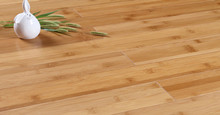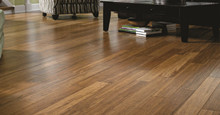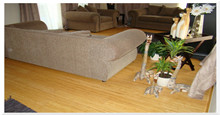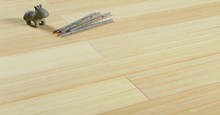Homeowners seeking a long-lasting, environmentally responsible, and fashionable substitute for conventional hardwood flooring are increasingly choosing strand-woven bamboo flooring. It‘s frequently promoted as a durable and environmentally friendly flooring option, but is it the best option for your house? Weighing the benefits and potential downsides is crucial before making a choice. In order to make an informed decision, this guide will assist you in understanding the benefits and drawbacks of strand-woven bamboo flooring.
Strand Woven Bamboo Flooring: What Is It?
Shredded bamboo fibres are compressed under extreme pressure and bound with adhesives to form strand woven bamboo flooring, which is a dense and long-lasting flooring material. Strand woven bamboo is a unique manufacturing technique that makes it significantly stronger than regular bamboo flooring, which is manufactured by laminating strips of bamboo together.
Benefits of Bamboo Strand Woven Flooring
1. Outstanding Sturdiness
The longevity of strand-woven bamboo flooring is one of its main benefits. It is a great option for high-traffic areas because it is much tougher than conventional hardwoods like oak and maple. Strand-woven bamboo is rated at over 3,000 on the Janka hardness scale, which measures wood hardness, while oak is rated between 1,200 and 1,400. Because of this, it is resistant to dents and scratches, making it perfect for homes with kids and dogs.
2. Eco-Friendly Option
Compared to hardwood trees, which can take decades to reach maturity, bamboo grows among the quickest plants in the world, reaching maturity in just five to seven years. Bamboo is regarded as a renewable resource due to its quick growth cycle. Strand woven bamboo flooring is a more eco-friendly alternative to conventional hardwood flooring when purchased from ethical producers.
3. Elegant and Adaptable Look
From natural tones to darker, carbonised shades, strand woven bamboo flooring is available in a range of colours and finishes. It might have a distinctive grain pattern that stands out while yet having the appearance of conventional hardwood. There is probably a bamboo flooring option to fit your style, whether it be modern, rustic, or classic.
4. Resistance to Moisture
Strand woven bamboo flooring is more resistant to moisture and humidity than conventional hardwood. This makes it an ideal choice for places with varying humidity levels, such as basements and kitchens. Spills should be cleaned up very away, though, as it‘s still not totally waterproof.
5. Simple Upkeep
Bamboo flooring that is strand woven requires less upkeep. Frequent vacuuming or sweeping gets rid of dirt and debris, and mopping with a moist mop—not wet—every now and again keeps it looking nice. Bamboo is a low-maintenance option for hectic homes because it doesn‘t need to be refinished as often as some hardwoods.
6. An Affordable Substitute for Hardwood
Although premium strand-woven bamboo flooring can cost about the same as hardwood, it usually provides greater durability for the money. Strand woven bamboo can be a great alternative if you‘re searching for a durable and fashionable flooring option without the high cost of exotic hardwoods.
Drawbacks of Bamboo Strand Woven Flooring
1. Being prone to scratches
Strand-woven bamboo is not totally impervious to scratches, despite being harder than many conventional hardwoods. Marks can still be left by sharp items, furniture legs, and pet claws. Surface damage can be reduced by keeping pet nails clipped and placing protective mats underneath furniture.
2. Possibility of Wet Damage
Strand-woven bamboo is not waterproof, but it is more resistant to moisture than conventional hardwood. Warping, swelling, or cupping may result from prolonged exposure to standing water or high humidity. You might need to take particular care to avoid moisture-related problems if you reside in an area that is extremely humid or damp.
3. Quality Variability
Bamboo flooring that is strand woven is not all made equal. Certain inferior products might have a lot of glue and formaldehyde, which can release dangerous toxins into your house. Selecting flooring that satisfies industry standards for indoor air quality, such as those approved by the Forest Stewardship Council (FSC) or FloorScore, is crucial.
4. Installation Challenges for Do-It-Yourselfers
Compared to softer hardwoods, strand woven bamboo flooring is more difficult to cut and install due to its great density. You might require specific tools and a little more work if you want to install it yourself. To guarantee a smooth and secure fit, many homeowners decide to work with a professional installer.
5. Fewer Options for Refinishing
Strand woven bamboo flooring has a tougher surface that could be more difficult to restore than solid hardwood, which can be sanded and refinished numerous times. It might be necessary to replace individual planks if there are severe scratches or other damage. Limited refinishing is possible with certain premium variants, albeit this relies on how deep the wear layer is.
6. Colour Shifts With Time
Strand-woven bamboo, like many other natural flooring materials, can change colour when exposed to direct sunshine. Depending on the finish type, it may deepen or fade over time. This effect can be lessened by placing area rugs or window curtains in places that receive direct sunshine.
Are You a Good Fit for Strand Woven Bamboo Flooring?
Many homeowners find strand woven bamboo flooring to be an appealing option because it combines eco-friendliness, durability, and style. However, it‘s crucial to take into account certain disadvantages including moisture sensitivity and brand-to-brand variations in quality.
Strand woven bamboo can be a fantastic choice for your house if you‘re looking for a durable, fashionable, and reasonably priced flooring solution that is more environmentally friendly than typical hardwood. To extend its longevity, make sure you pick a high-quality device from a reliable manufacturer and take the right care of it.
Take into account the particular requirements of your household and carefully balance these benefits and drawbacks before making your choice. Although strand woven bamboo flooring has many advantages, it is not without drawbacks, depending on your priorities: environmental effect, durability, or aesthetic appeal.



